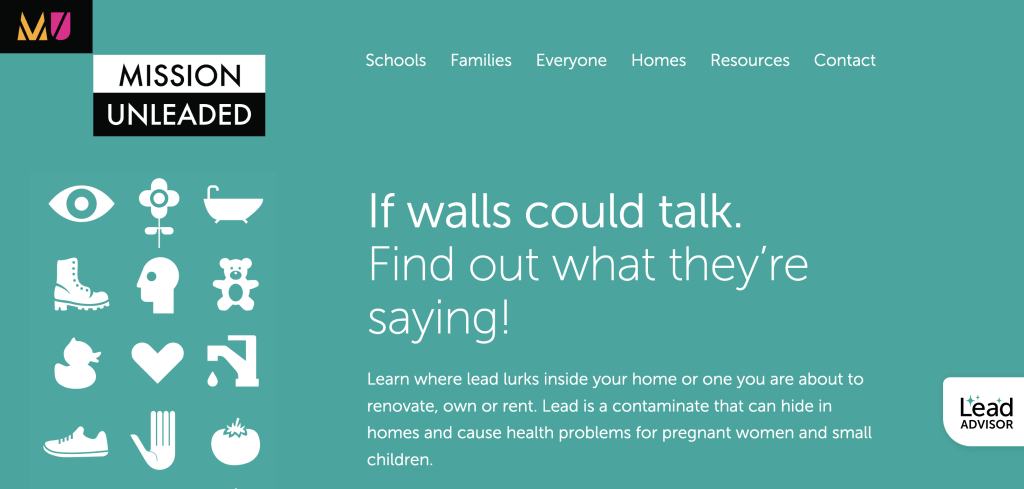
What Happened
Indianapolis’ Marion County Public Health Department (MCPHD) recently updated its Mission Unleaded website by adding a new property history search tool, called the LeadADVISOR. The search tool provides information on the results from lead-related investigations for almost 6,000 addresses, with more added on an ongoing basis. To make it more accessible to the public, the tool uses artificial intelligence (AI) from ChatGPT.
MCPHD is one of a small cadre of local health departments with environmental health programs that have responsibility for promulgating and enforcing housing codes to protect resident’s health and safety.1 For more than 25 years, the county’s code has required residential property owners to “remediate deteriorated lead-based paint, dust-lead hazards, paint-lead hazards, soil-lead hazards, asbestos, or any other hazardous materials.”2
The agency uses a combination of complaints, individual health data (such as blood lead testing), and proactive efforts to trigger investigations. When violations are found, the health department issues a remediation order, follows-up to ensure a return to compliance, and is willing to go to court to enforce compliance.
Since 2000, the health department has posted virtually all its housing code inspection and enforcement activities online in a searchable database. This includes lead investigations but also an array of inspections for other health and safety hazards such as pests, indoor air quality, garbage, sewage, egress, alarms, and temperatures (too hot or too cold).
While the existing code inspection and enforcement database is helpful, it is not particularly user-friendly and requires users to contact the health department to get details of the investigations, such as lead hazard testing results. The Mission Unleaded property history search is different because it provides critical details people need to know quickly in a user-friendly format.
Why it Matters
Disclosure of information concerning lead when residential property is sold or rented is a pillar of the Residential Lead-based Paint Hazard Reduction Act of 1992.3 Since 1996, when the rules went in effect, virtually everyone who sells or rents a house built before 1978 must disclose what is known—positive or negative—about lead-based paint and related hazards.4 If nothing is known, the person can mark the “don’t know” box.
This disclosure, when it happens, does little for people with few options such as those who have limited resources or who cannot easily move. For these folks, housing code enforcement is essential, especially when it is proactive, to prevent, rather than simply react to, lead exposure.
Our Take
MCPHD’s Mission Unleaded website takes its long-standing transparency efforts to another level by:
- Providing the details on lead testing results that enable people, whether buyers, sellers, neighbors, or current residents, to more quickly access information about lead risks to empower residents to make informed decisions and advocate with their landlords and community leaders for improvements. Hopefully, the transparency will encourage property owners to more quickly remediate problems to show the problems were addressed and then incorporate it into future sales or leases.
- Leveraging AI tools to make the information more useful to people by continuously refining its responses based on the questions and follow-up questions asked. It also reduces the burden on the health department in making the information available and responding to questions.
- Serves as a platform to expand the efforts beyond lead risk assessments by adding the presence of lead service lines, essentially lead pipes that connect drinking water mains to homes. Citizens Energy Group, the water utility for the county, reports having 55,000 and 75,000 lead service lines in its system.
In the spirit of disclosure, Unleaded Kids’ Tom Neltner acknowledges he is a big fan of MCPHD based on his 23 years living in the county and watching the health department in action. In the 1990s, Dr. Virginia Caine, MCPHD’s director, undertook extraordinary efforts to block proposals by the mayor to move the housing code enforcement to the building code enforcement.
Dr. Caine recognized that housing codes enforcement is a critical tool to protect public health and safety that too easily gets lost in the community development focus of building code departments. After 30 years in that role, she remains the director and has a great team with her, including Karla Johnson handling lead investigations.
We applaud MCPHD, especially as it expands and improves its Mission Unleaded website. We also encourage others to work with MCPHD to expand the learning community of local health departments seeking to help their residents through greater transparency and use of new tools like AI.
- This is another code for nonresidential premises. ↩︎
- Section 10-307. ↩︎
- Section 1018, codified at 42 U.S.C. § 4852d. See also 40 C.F.R. Part 745, Subpart F. ↩︎
- There are six exemptions: 1) housing for the elderly or persons with disabilities; 2) any 0-bedroom dwelling (unless any child who is less than 6 years of age resides or is expected to reside in such housing); 3) sales at foreclosure; 4) short-term leases of 100 days or less where no renewal or extension can occur; 5) lead found to be free of lead-based paint by an EPA or state certified inspector; and 6) renewals of existing leases where no new information. ↩︎
